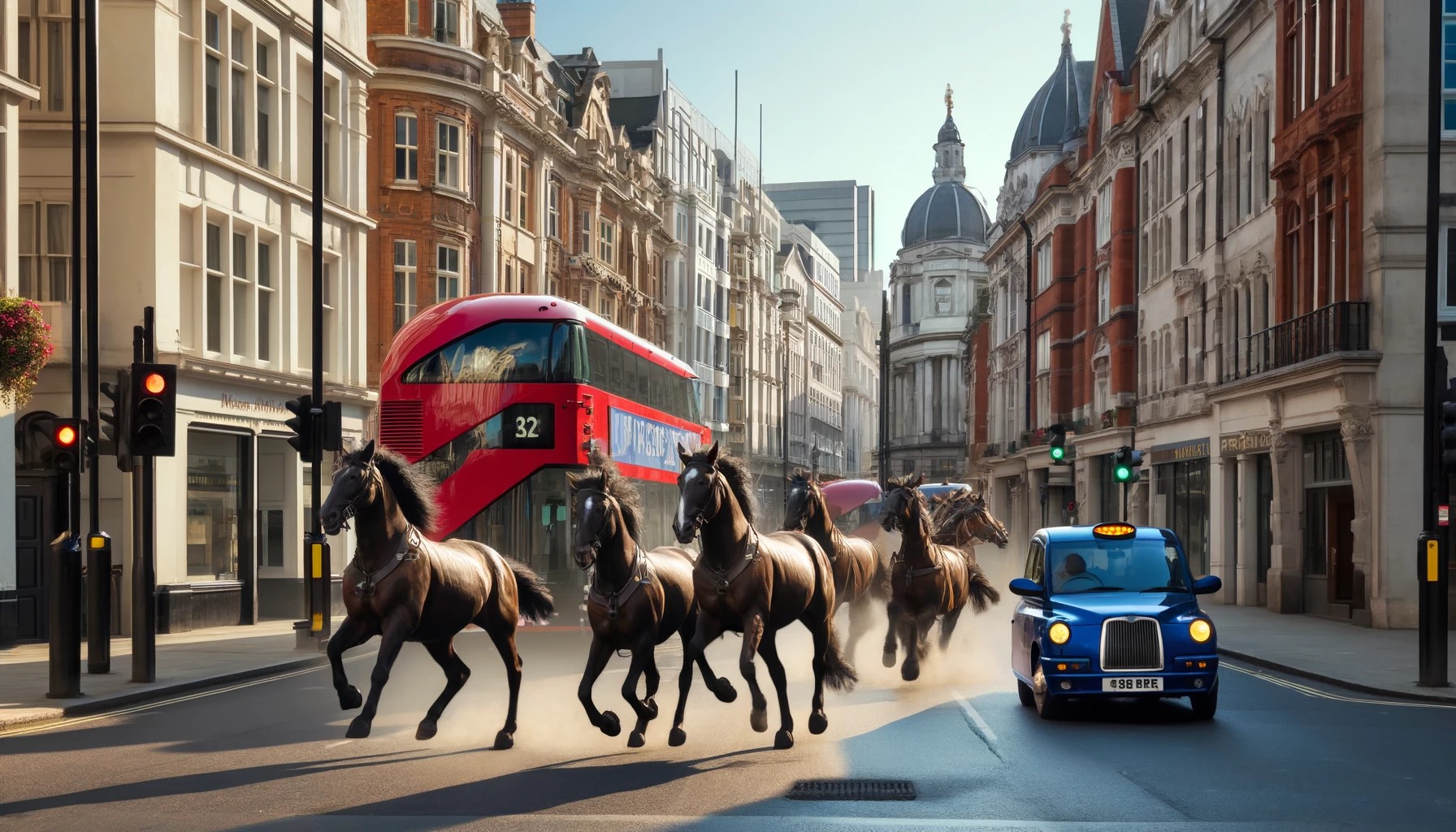
Serious arguments, economic and moral, exist to justify the state (the central and sovereign apparatus of government). Serious objections to these arguments also exist. It is interesting to note that most people, including most economists, ignore both kinds.
I thought about this when I read the funny factoid reported by the Wall Street Journal about the king’s horses running amok in London this morning (“King’s Horses Run Amok in London, Escaping Monarch’s Birthday-Parade Practice,” April 24, 2024):
Several of the king’s horses and a few of his men sparked chaos on this capital’s streets Wednesday when members of the Household Cavalry lost their mounts, allowing the animals to gallop through rush-hour traffic, careering into cabs and double-decker buses while being pursued by police over several miles. …
The news that equine members of the Household Cavalry—which styles itself as the “trusted guardians of the monarch”—had gone rogue soon lit up social media.
“How could we have the king’s horses without the state?” would not be a serious argument, except perhaps as a recognition of the importance of traditions. It would certainly not be a decisive argument in favor of the monstrous states we now have. The king’s horses weigh little compared to, say, the strong arguments against the state developed by Anthony de Jasay—who was also a strong supporter of conventions and traditions. On de Jasay, see my post of this morning as well as my Econlib review of his Against Politics.
*******************************
DALL-E has no information of the king’s horses galloping in London this morning. I thus asked ze to imagine such an event. I use one of zir responses as the featured image of this post.

DALL-E imagines the king’s horses running amok in London

READER COMMENTS
Jose Pablo
Apr 24 2024 at 8:20pm
Serious arguments, economic and moral, exist to justify the state (the central and sovereign apparatus of government).
There are two different “discussions” regarding governments:
one is what kind of “government” makes “sense” to have. A positive discussion on, basically, two questions: first which decisions belong to the realm of the collective (and which are better left to the individuals), and second, what the best way of making collective decissions is.
the other “area” is how actual “governments” really work and why.
What is striking (worrying?) is how far apart are “actual states” from the positively theoretical ideal. Apart and drifting away. Or even how apart are what real states really are from what the “subjects” think they are.
For instance, a king and his horses play no role in any form of state that can “survive” a positive analysis of what a state should be. And yet, the institution (and the equines) have managed to survive in an awfully large amount of “states”. And where they have survived, they are, in reality, a purely decorative element, and yet, many people think they are one of the pillars of the state (the king, not the equines … I think).
Pierre Lemieux
Apr 24 2024 at 9:24pm
Jose: I agree with the gist of your argument and would just add the following. Suppose that, in the first discussion, it is found that some collective choices are unavoidable and that a state is required to make or implement them. Then, the second discussion would be the matter of Buchanan et al.’s constitutional political economy: How to constrain the state so that it accomplishes its required role (and no more).
Only if it is found that the state is not required for any collective choice (de Jasay’s position, except perhaps for protection against foreign tyrants) is anarchy to be pursued. How is should be pursued is another question.
In both cases, indeed, the problem is not a piece of cake. Compared to them, the king’s horses is a non-problem. Indeed, they might exist in de Jasay’s “capitalist state” if it were not unstable.
Jose Pablo
Apr 25 2024 at 1:10pm
Agree. And yet, there is something that political economy (or even political philosophy) fails to explain (maybe the realm of “political psychology”?)
Humans crave power (raw arbitrary goalless power) and we crave “identity” (and collective identity is an easy escape to the very prevalent failure to build an attractive enough individual identity). The “state” provides some relief to both cravings. Even more, states are “designed” (the king ornaments, the king horses, the buildings, the formalities, flags, anthems …) to provide relief to both individual’s cravings.
The Milgram Experiments, the Stanford Prison Experiment, and some more show the deep way in which we, humans, are attached to power. Forcing others to do as we wish no doubt has its charm. Feeling that we force others to do as we wish “through” the mandates of a government we voted for, is a nice close second best.
By definition, most individuals have to be ordinary individuals. Being part of a “collectivity” provides some relief to that feeling. Much more so if this “collectivity” is all-powerful, has a providential destiny, is light-skinned, is a “closed club” club at which people camping at the border will never be admitted.
You make a list of how to make this collective identity more attractive to otherwise uninteresting individuals, and you will be surprised by how closely it matches politically relevant issues.
The state is a monster preying on the darkest corners of the human soul (mostly male human souls). That makes anarchy attractive, even if the state were required for some collective choices.
Comments are closed.